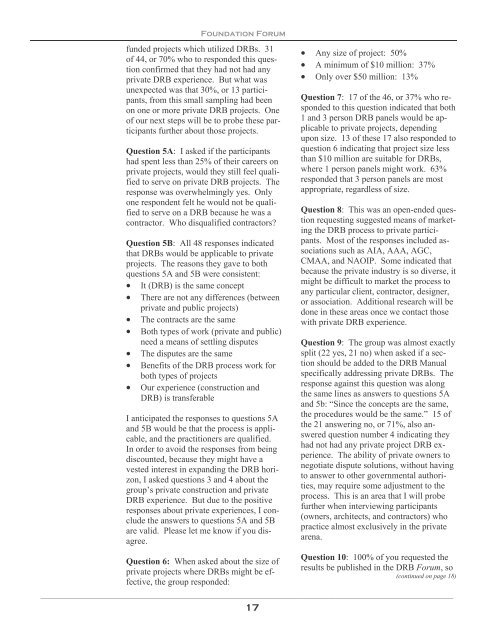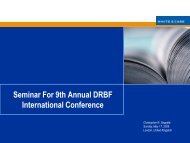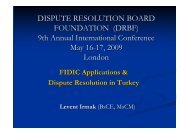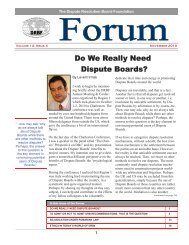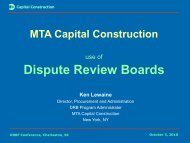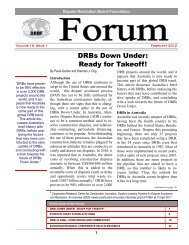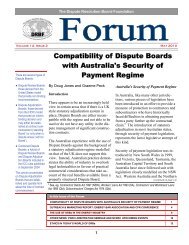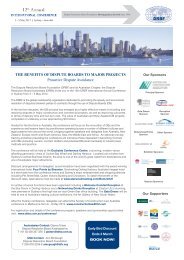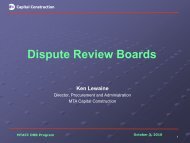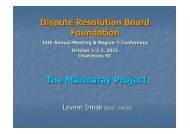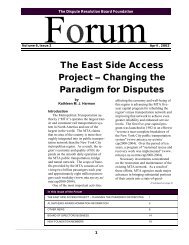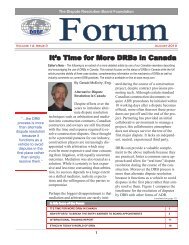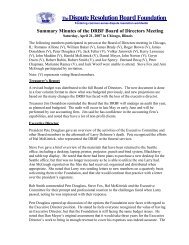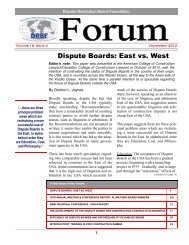DRBF NAMES EXECUTIVE DIRECTOR - Dispute Resolution Board Foundation
DRBF NAMES EXECUTIVE DIRECTOR - Dispute Resolution Board Foundation
DRBF NAMES EXECUTIVE DIRECTOR - Dispute Resolution Board Foundation
You also want an ePaper? Increase the reach of your titles
YUMPU automatically turns print PDFs into web optimized ePapers that Google loves.
<strong>Foundation</strong> Forum<br />
funded projects which utilized DRBs. 31<br />
of 44, or 70% who to responded this question<br />
confirmed that they had not had any<br />
private DRB experience. But what was<br />
unexpected was that 30%, or 13 participants,<br />
from this small sampling had been<br />
on one or more private DRB projects. One<br />
of our next steps will be to probe these participants<br />
further about those projects.<br />
Question 5A: I asked if the participants<br />
had spent less than 25% of their careers on<br />
private projects, would they still feel qualified<br />
to serve on private DRB projects. The<br />
response was overwhelmingly yes. Only<br />
one respondent felt he would not be qualified<br />
to serve on a DRB because he was a<br />
contractor. Who disqualified contractors?<br />
Question 5B: All 48 responses indicated<br />
that DRBs would be applicable to private<br />
projects. The reasons they gave to both<br />
questions 5A and 5B were consistent:<br />
• It (DRB) is the same concept<br />
• There are not any differences (between<br />
private and public projects)<br />
• The contracts are the same<br />
• Both types of work (private and public)<br />
need a means of settling disputes<br />
• The disputes are the same<br />
• Benefits of the DRB process work for<br />
both types of projects<br />
• Our experience (construction and<br />
DRB) is transferable<br />
I anticipated the responses to questions 5A<br />
and 5B would be that the process is applicable,<br />
and the practitioners are qualified.<br />
In order to avoid the responses from being<br />
discounted, because they might have a<br />
vested interest in expanding the DRB horizon,<br />
I asked questions 3 and 4 about the<br />
group’s private construction and private<br />
DRB experience. But due to the positive<br />
responses about private experiences, I conclude<br />
the answers to questions 5A and 5B<br />
are valid. Please let me know if you disagree.<br />
Question 6: When asked about the size of<br />
private projects where DRBs might be effective,<br />
the group responded:<br />
• Any size of project: 50%<br />
• A minimum of $10 million: 37%<br />
• Only over $50 million: 13%<br />
Question 7: 17 of the 46, or 37% who responded<br />
to this question indicated that both<br />
1 and 3 person DRB panels would be applicable<br />
to private projects, depending<br />
upon size. 13 of these 17 also responded to<br />
question 6 indicating that project size less<br />
than $10 million are suitable for DRBs,<br />
where 1 person panels might work. 63%<br />
responded that 3 person panels are most<br />
appropriate, regardless of size.<br />
Question 8: This was an open-ended question<br />
requesting suggested means of marketing<br />
the DRB process to private participants.<br />
Most of the responses included associations<br />
such as AIA, AAA, AGC,<br />
CMAA, and NAOIP. Some indicated that<br />
because the private industry is so diverse, it<br />
might be difficult to market the process to<br />
any particular client, contractor, designer,<br />
or association. Additional research will be<br />
done in these areas once we contact those<br />
with private DRB experience.<br />
Question 9: The group was almost exactly<br />
split (22 yes, 21 no) when asked if a section<br />
should be added to the DRB Manual<br />
specifically addressing private DRBs. The<br />
response against this question was along<br />
the same lines as answers to questions 5A<br />
and 5b: “Since the concepts are the same,<br />
the procedures would be the same.” 15 of<br />
the 21 answering no, or 71%, also answered<br />
question number 4 indicating they<br />
had not had any private project DRB experience.<br />
The ability of private owners to<br />
negotiate dispute solutions, without having<br />
to answer to other governmental authorities,<br />
may require some adjustment to the<br />
process. This is an area that I will probe<br />
further when interviewing participants<br />
(owners, architects, and contractors) who<br />
practice almost exclusively in the private<br />
arena.<br />
Question 10: 100% of you requested the<br />
results be published in the DRB Forum, so<br />
(continued on page 18)<br />
———————————————————————————————————————————————————<br />
17


